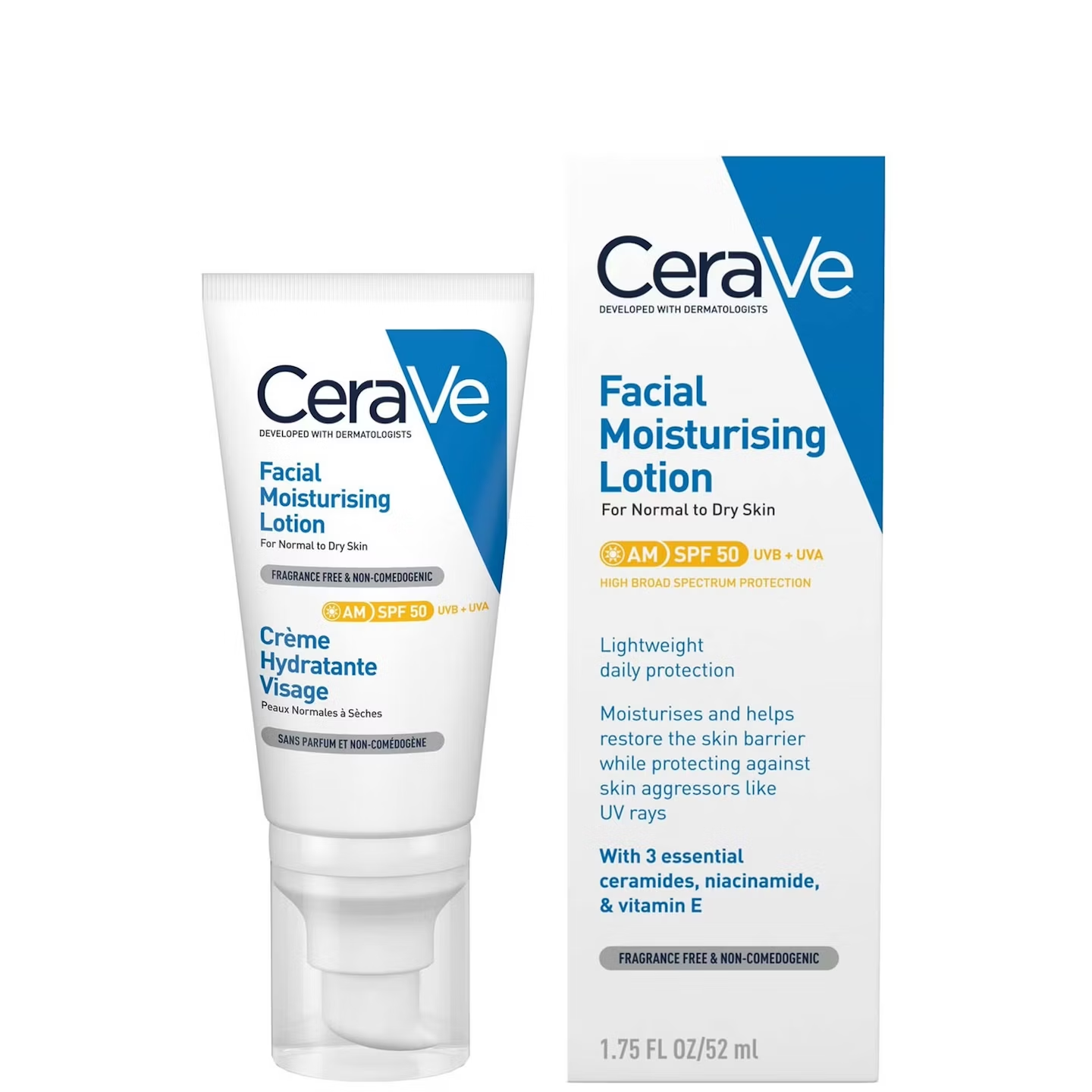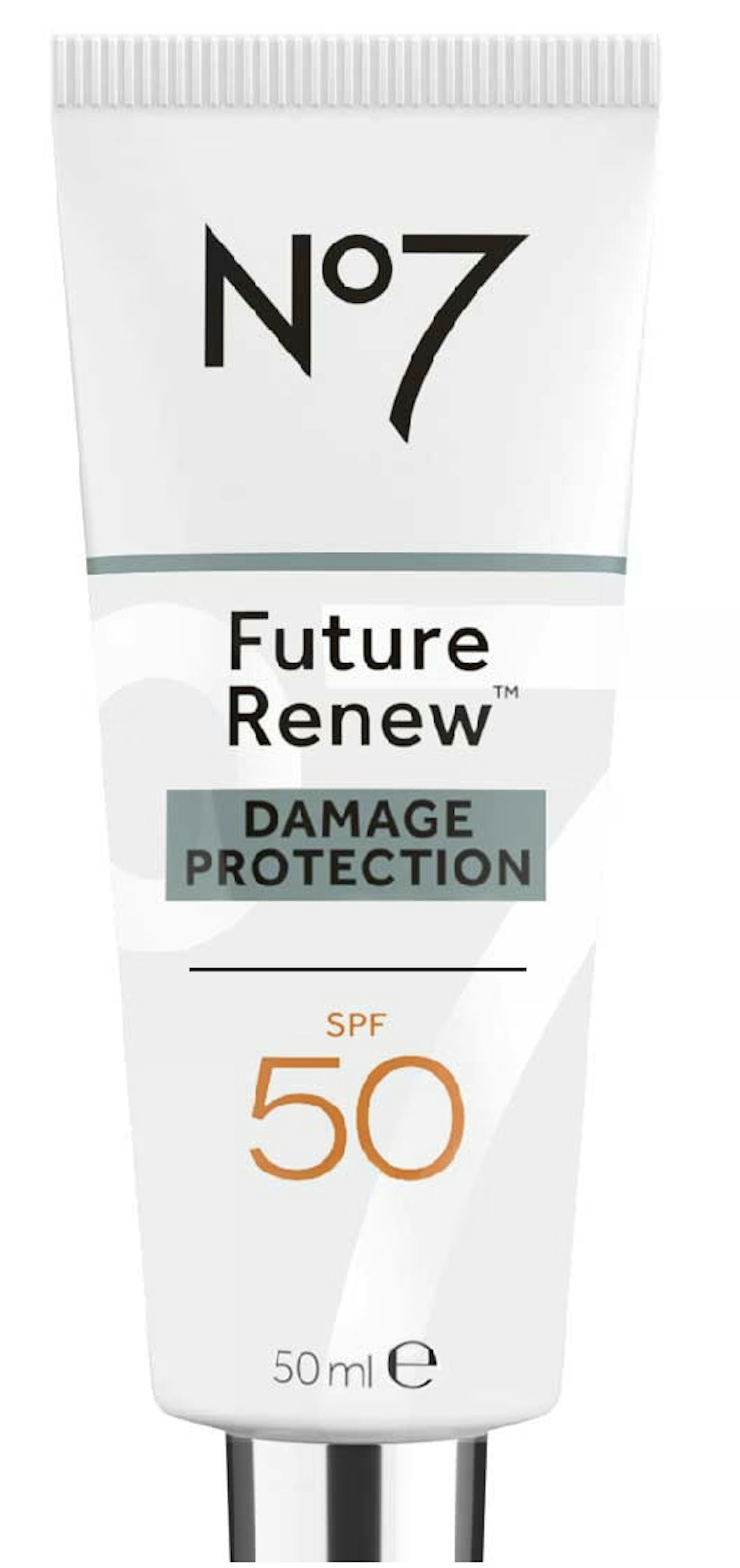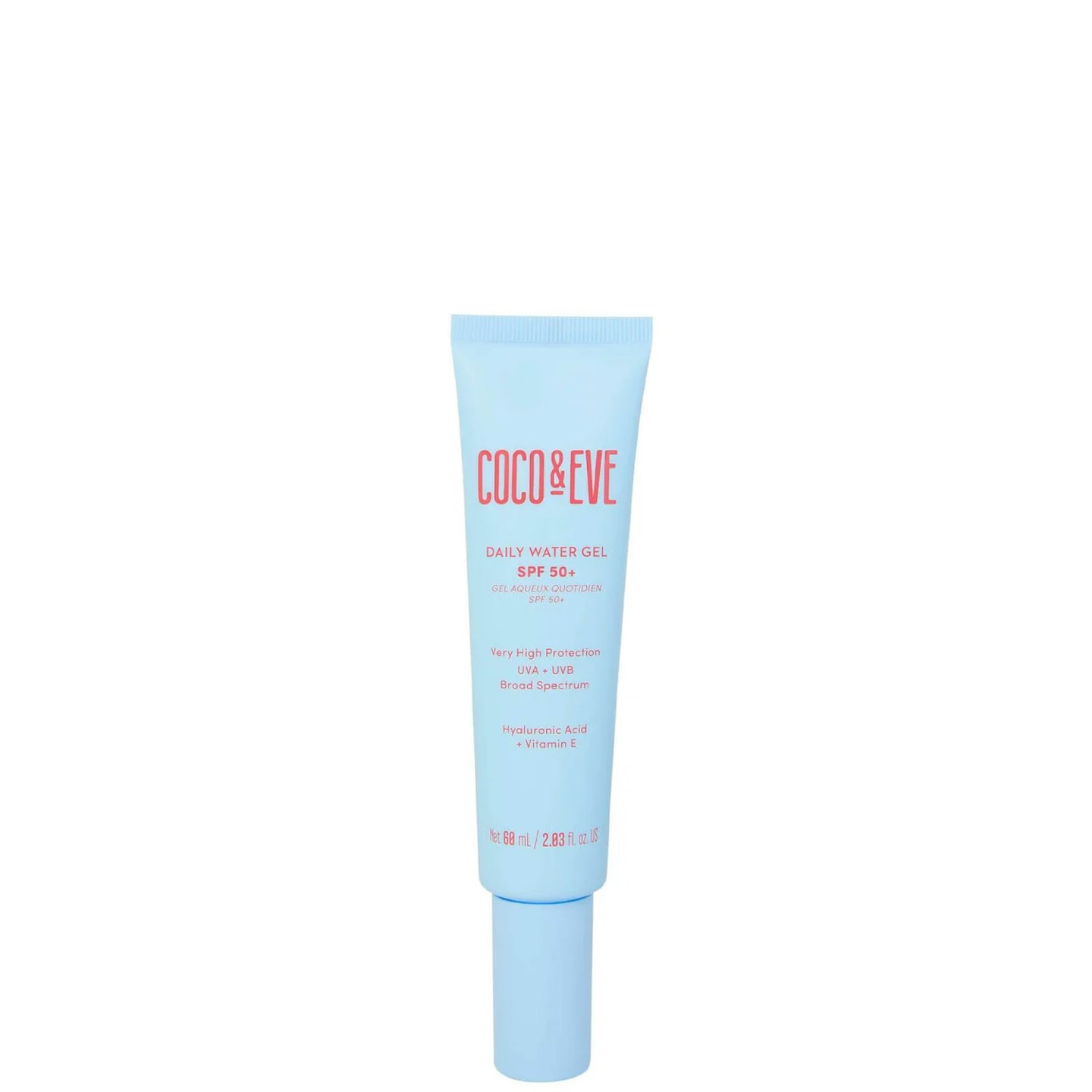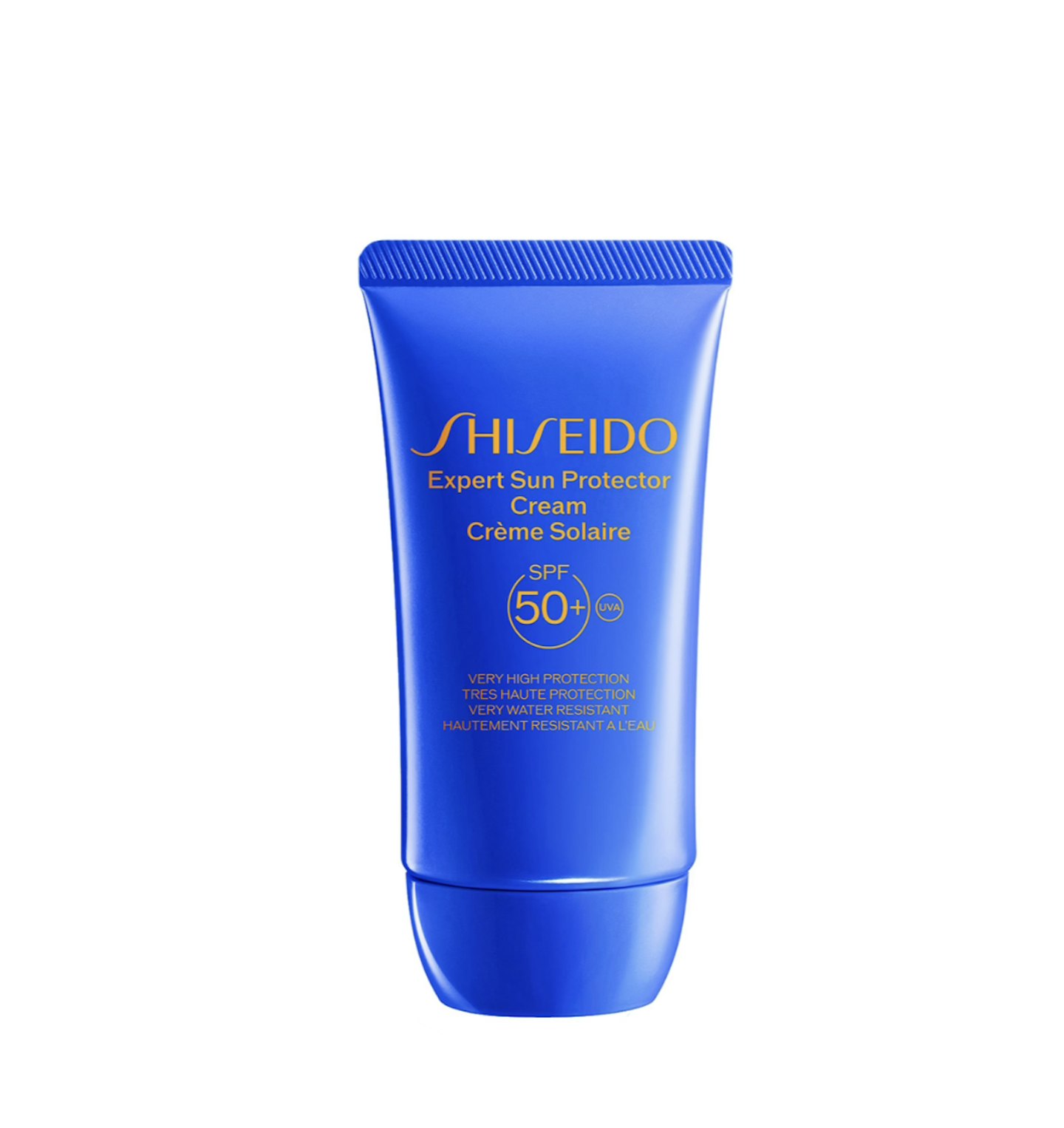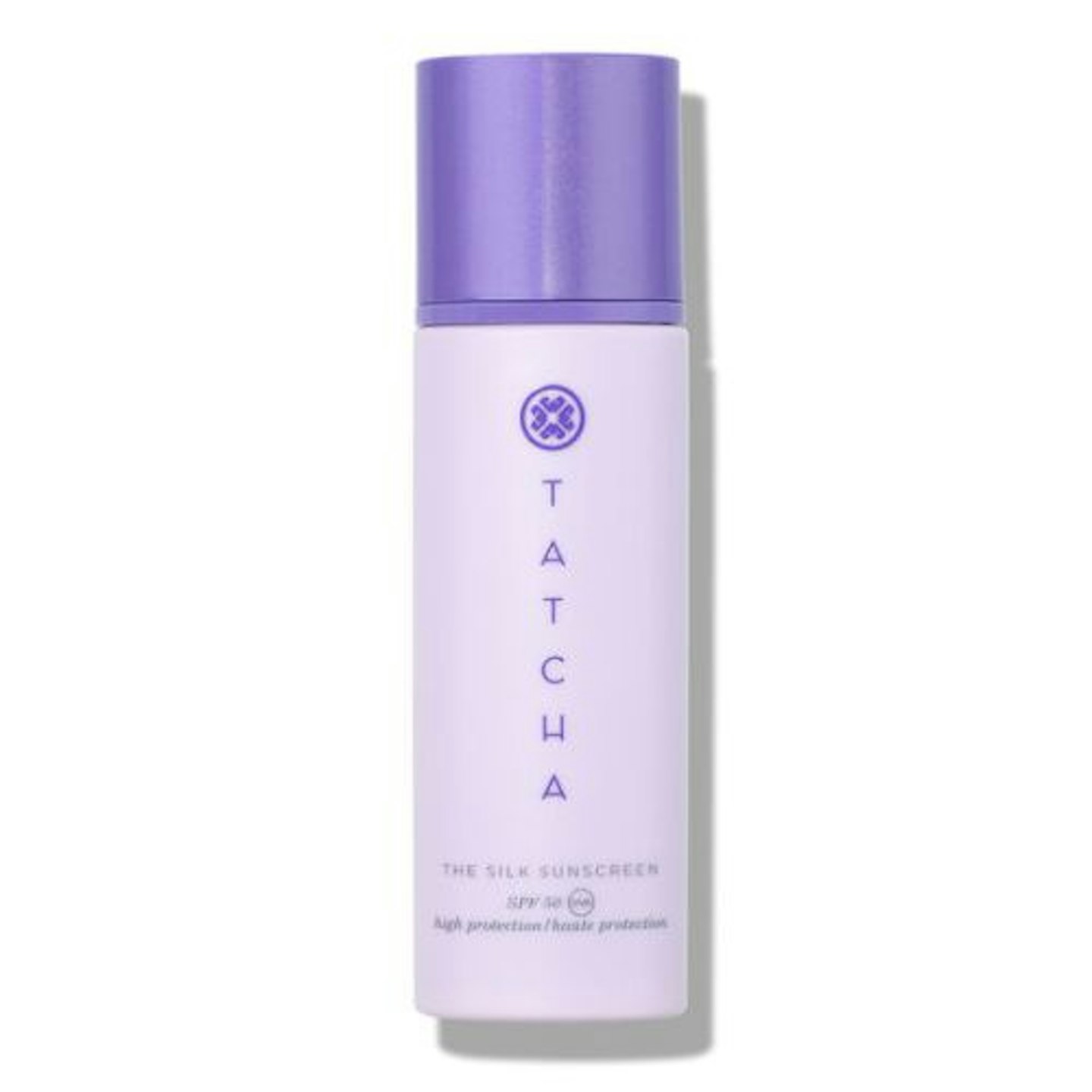Finding the right SPF is no easy job - trust me, as a beauty journalist I've sifted and sorted through copious amounts in a bid to find the best sunscreen for face. And this week, arming myself with the very best in suncare appeared to be as important as ever. With heatwave temperatures soaring to 28 degrees in the UK, I was slathering, spritzing and spraying the formulas I always retreat to. But come rain or shine, let it be known that sun protection is always an every day non-negotiable in the journey to healthy skin, as UV rays are present year-round (more on that later).
If you've been struggling to find the right one, now would be a brilliant time to begin the search as the suncare industry has had a major glow-up. Forecasted to be worth nearly $20bn by 2030, sunscreens are now the most-mentioned skincare product on #suntok (it’s a thing), something largely fuelled by product innovation. Gone are the days of chalky, unctuous lotions, now undetectable, kind-to-skin, zero white caste, and a great make-up base is the standard order for an SPF in 2025. ‘The only way to get people to consistently apply sunscreen is to make it a step of their routine they look forward to,’ says Dr Sophie Shotter, an aesthetic doctor. ‘That’s what many modern formulations achieve.’
There is a sticking point, though: application. Or lack thereof. According to YouGov survey of 2,081 people commissioned earlier this year, 45% of the UK do not apply daily SPF. The stark figures become all the more worrying when you consider the seriously damaging effects of unprotected sun exposure. Simply put, 'UV rays from the sun cause damage to the skin, accelerating ageing and increasing the risk of skin cancer. Sunscreens block this UV damage and protect against all the negative effects it can have,' explains Dr Ajoy Bardhan, NHS consultantdermatologist.
While UV radiation is present all year round, there is definitely more reason to be more concerned during the summer. 'People are not only naturally exposed to longer periods of daylight and more intense sun exposure, but they also tend to do more outdoor activities such as gardening, sport and swimming. UV exposure is at its peak during the summer months and the intensity of UV radiation and exposure time also increases the risk of sunburn,' explains Dr Bardhan, 'The UV index doesn’t get very high in the colder months, so it is slightly less important, although I'd advise using SPF daily as part of your facial skincare routine.'
Understanding sunscreen labels
There's a lot to unpack when trying to understand what is printed on SPF label, Dr Bardhan clarifies what you need to know below.
SPF: Stands for Sun Protection Factor and is a measure of protection against UVB rays. The higher the number, the greater the protection against UVB, the main cause of sunburn. SPF30 gives around 97% protection against UVB, whilst SPF50 blocks around 98%.
PA rating: This indicates protection against UVA rays. The higher the PA rating, the greater the protection against UVB, which causes long-term sun damage including quicker ageing. So, PA+ implies mild protection, whereas PA++++ implies very high protection.
Broad-spectrum: The includes protection from both UVB and UVA, and will therefore feature a SPF and PA 5-star rating system on labels.
Filters: Sunscreens can provide protection through chemical filters or mineral filters. Chemical sunscreens (including ingredients such as oxybenzone and octycrylene) absorb UV and turn it into heat which is then released from the skin, whereas mineral filters (such as zinc oxide and titanium dixoide) are physical blocks of UV. Mineral sunscreens are effective straight away, but are thicker in texture and have been known to leave white casts on the skin making them unideal for medium and deeper skin tones. Chemical sunscreens, although transparent and easier to apply, takes 20 minutes or so to be effective.
Choosing sunscreens based on skin type
Dry skin: If you have dehydrated or dry skin, look out for creamy formulas with hydrating properties. Moisturisers with inbuilt sun protection would be a good choice.
Oily/ combination skin: Opt for lightweight formulas with gel-cream or fluid textures that have a power to matify and control oil while protecting the skin.
Sensitive/ acne-prone skin: Avoid chemical sunscreens and opt for mineral sunscreens that are non-comedogenic and formulated without fragrance, alcohol, oil or common irritants.
Mature skin: Tinted or antioxidant-rich formulas can help to brighten and smooth fine lines.
Grazia's Best Sunscreens For Face 2025, At A Glance
Best face sunscreen for everyday: Ultra Violette Supreme Screen SPF50+ Hydrating Skinscreen, £34
Best hydrating face sunscreen: CeraVe Facial Moisturising Lotion AM SPF50, £16.50
Best dewy-finish face sunscreen: Coco & Eve Daily Watergel SPF50, £18.40
Best face sunscreen for working out: Supergoop! Play Everyday Lotion SPF50, £12
Best spf 50+ face sunscreen: Shiseido Expert Sun Protector Cream SPF 30, £36
How we tested the best sunscreens for face in 2025
As beauty experts, we have tested countless sunscreens for face over a number of years in order to gain a real sense of the formulas that are truthfully worth your attention. While testing the SPFs that would win a spot in this edit, we looked out for a few key pain points throughout the testing phase: the level of protection they offered; the texture and application experience; and the finish and overall results. We ranked each SPF against how they performed in these respects.
Formula: As with all of the testing, considering the formula is a great place to start. We noted what ingredients were present, the type of filter used, and the level of protection they offered, and how this all faired based on different skin types.
Application experience: While testing the products, we thought about the texture of each to determine how comfortable they felt on this skin during the application process. We questioned if textures where thick, greasy or stung in any way, to name a few.
Results: The obvious one. But when thinking about the results, we considered whether the SPFs really provided the level of protection needed while still respecting the skin's hydration and comfort levels. And, a final thought was given to how they sat under make-up and how our skin looked in the long run throughout the day
Shop: The Best Face SPFs For Summer 2025
What the brand says: 'This lightweight, mineral sun-active formulation has a satin and non-whitening finish and has been designed for everyday use with seamless application under makeup. Start your day with supple, luminous skin. This product is TGA & FDA registered. It is also dermatologically tested, proven to be non-irritating and suitable for all skin types, including sensitive skin. Using this SPF 50 alongside other sun protection can aid in the prevention of premature skin ageing and sunspots.'
What we know: This sun protecting cream contains 20% zinc oxide for mineral-based UVA and UVB defence, as well as brightening, antioxidant-rich niacinamide and a skin revitalising biopeptide.
Rachael Martin, beauty editor, says: 'The colour is the first thing I notice. It’s pink, and resembles a skin tint. As someone with a complexion prone to redness, I’m immediately apprehensive. Applying something so warm to my already pink skin? Well, it doesn’t fill me with confidence. Immediately after applying I’m pinker still. While it’s not sticky, there’s an instant flush of redness that leaves me convinced this isn’t the SPF for me. Yet patience, as it turns out, is key. Within a few minutes the redness had settled, replaced with a more even skin tone. There's no sign of an ashy white cast, but as someone with lighter skin I would be interested to see how it plays on someone with darker complexion. While there's little coverage, there is a subtle glisten - think a hydrated radiance that doesn’t stray into sparkle territory (which is my personal beauty bête noire). My complexion tends to become oilier as the day goes on, so ensuring that my SPF is light and non-greasy is often tricky, but this one plays beautifully and wears well under make-up. My breakouts and redness have reduced too, which I’m attributing to the infusion of niacinamide, an active known for its ability to take down blemishes. My only gripe is the price. It's expensive at £46. But for such an impressive list of all encompassing benefits? I'd say it's money well spent. Check out myfull review here.'
Pros
- Suited to all skin types
- Refillable jar
Cons
- Expensive
| SPF level | Broad-spectrum SPF 50 |
| Size | 50ml |
| Mineral or chemical | Mineral |
| Key ingredients | Niacinamide and biopeptides |
| Consistency | Lightweight |
What the brand says: 'Suncare meets skincare in this lightweight, broad-spectrum sunscreen. This fast-absorbing formula protects against UVA and UVB rays and renews the skin at the same time, preventing and reducing visible signs of aging. Your daily SPF 50. Powered by TFC8®.'
What we know: Formulated with the brand's proprietary skin cell renewing TFC8® technology, photodamage-protecting cotton seed extract, restorative microalgae extract and an antioxidant-rich botanical complex that boasts pomegranate flowers and kakadu plum, this works to protect the skin pre-sun exposure and defends against delayed sun-induced skin damage too, so you are covered at every stage.
Rachael Martin, beauty editor, says: ‘I haven’t had the chance to test this SPF in the long run yet, but consider me intrigued. I adore Augustinus Bader products and my bathroom cabinet is jam-packed with those glinting blue bottles. My initial thoughts? Sunscreens are tricky to get right. Yet Bader’s new formulation feels weightless and non-greasy, sinking into the skin on the back of my hand beautifully. And the clinical trials (tested on all skin types) look promising. A whopping 99% of users said their skin felt hydrated, 97% said it looked smoother, and 89% agreed that fine lines and wrinkles appeared reduced. It’s not a shock - such results are the reason his products sell out time and time again. There’s no denying the price is a hit. A hefty one at that. But where Bader is concerned? Loyalists will assure you it's worth every penny.'
Pros
- Vegan
- Consistently excellent reviews
Cons
- Expensive
| SPF level | Broad-spectrum, high SPF 50 protection against UVA & UVB rays with 4 clean UV filters |
| Size | 30ml |
| Mineral or chemical | Mineral |
| Key ingredients | TFC8® technology, cotton seed extract, microalgae extract and a botanical complex |
| Consistency | Light |
What the brand says: 'An ultra-lightweight, non-greasy sunscreen, designed to deliver broad-spectrum protection without leaving your skin feeling greasy or heavy. Our new, light-as-air formula protects against UVB and everyday UVA rays, making it perfect for daily use.'
What we know: This serum based sunscreen is loaded with skincare heroes like niacinamide and hyaluronic acid for antioxidant protection and hydration level maintenance. It is a lightweight formula and is suitable for all skin types.
****Rachael Martin, beauty editor, says: ‘I’m incredibly fussy when it comes to which SPF I use. I have oily, acne-prone sensitive skin, so finding something that won’t slide right off, or, by contrast, block my pores, is never easy. At this point, La Roche is well known for its prowess in the realm of excellent sunscreen - there’s a reason why the French pharmacy brand are celebrating their 50th anniversary, after all. Once again, they’ve hit the nail on the head with UVAir. If you’re after a light, every day SPF then this could be just the ticket. The texture is everything I look for in a facial sunscreen. It’s silky and fluid, milky and light. Although I typically apply quite a lot of it (the more the merrier where SPF is concerned) it sinks in quickly, like a second skin and doesn't leave a white cast. It’s also refreshingly non-greasy - there’s fancy ‘Zero-Gram Feel Air Phase’ technology, which, in layman's terms, helps control oiliness for up to 16 hours. One of my biggest beauty bugbears is pilling - but this acts like a primer, leaving my skin soft, smooth and perfectly prepped ahead of my foundation. The finish is a semi-matte one - shine is reduced without leaving my skin feeling dry or tight. My only gripe is in the size. The bottle is small at 40ml and I’m well over half way finished despite only having used it for three weeks. If there was a bigger option, I'd definitely invest to save the faff of repurchasing every six weeks or so.'
Pros
- Contains hyaluronic acid and niacinamide
- Non-greasy, weightless formula. Helps control oiliness for up to 16H*
Cons
- Small size
| SPF level | SPF50+ |
| Size | 40ml |
| Mineral or chemical | Chemical |
| Key ingredients | Niacinamide and hyaluronic acid |
| Consistency | Light |
Best lightweight face sunscreen
 Ultra Violette
Ultra Violettewww.spacenk.com
What the brand says: 'Future Fluid™ is a superlight mineral SPF 50+ serum, that leaves you with a natural, skin-perfected finish and protects from harmful UV rays and premature aging. This super-soothing, fragrance-free SPF gives skin a hydrating yet non-greasy finish, without that suffocating, heavy feeling of traditional zinc sunscreens.'
What we know: It includes Zinc from Japan that lends it a featherweight and gentle texture, as well as vitamin E, squalane and pentavitin® to hydrate, soothe and support the skin barrier. It comes equipped with powerful UVA and UVB protection and is suitabel for combination, oily or sensitive skin types.
Sameeha Shaikh, beauty writer, says: ‘I'm super picky with SPFs thanks to my acne-prone, combination skin type, which means over the years there are only a few sun protectors I will go back to time and time again. This is one. of them, it leaves my skin feeling soft, hydrated and with a healthy-looking glow that I definitely didn’t wake up with. It is lightweight and blends into my complexion pretty easier, though I will say it's not the lightest I've used nor the quickest-absorbing. That said, it does sit very nicely under make-up’
Pros
- Hydrating, non-comedogenic formula
- Sits comfortably under make-up
Cons
- Can't tell when product has run out
| SPF level | SPF50+ |
| Size | 50ml |
| Mineral or chemical | Mineral |
| Key ingredients | Japanese zinc, vitamin E, squalane and pentavitin® |
| Consistency | Superlight |
What the brand says: This sunscreen was developed with dermatologists and promises a lightweight feel with SPF 50+ UVB/UVA protection, as well as skincare hero ingredients. It hydrates for up to 24 hours and provides broad spectrum UV protection. It is fast-absorbing, non-greasy, and leaves no white residue.
What we know: This fuss-free SPF features hyaluronic acid, vitamin E, and three essential ceramides to help protect the skin’s natural barrier and leave skin feeling soothed and hydrated all day. It is non-comedogenic and suitable for all skin types.
Sameeha Shaikh, beauty writer, says: ‘This all-in-one moisturiser and SPF hits the spot, every day. My skincare staples are ceramides, niacinamide and vitamin E and this delivers all three. As a mineral sunscreen it’s on the thicker side but that just encourages me to go heavy on the facial massage.’
Pros
- Moisturiser benefits
- Full of nourishing ingredients
Cons
- Too rich for oily skin
| SPF level | SPF50 |
| Size | 52ml |
| Mineral or chemical | Mineral |
| Key ingredients | Hyaluronic acid, vitamin E, and three essential ceramides |
| Consistency | Thick |
What the brand says: 'This lightweight, invisible finish formula leaves skin looking and feeling hydrated, while helping to provide a defence shield against UV in sunlight. Formulated with our highest & and lightest SPF 50 sun protection, age-defying peptide technology, and hydrating sodium hyaluronate.'
What we know: This SPF is formulated with SPF 50 to help protect skin from visible skin damage including uneven skin tone, fine lines, wrinkles, and dryness. It promises a lightweight yet hydrated feel, and won't leave behind a white cast. The invisible texture is fast-absorbing and suitable for all skin tones. It also works very well under make-up.
****Rachael Martin, beauty editor, says: 'I’m incredibly impressed. I have oily skin, so ensuring that my SPF is light and non-greasy is often tricky, but I needn’t have worried with this one - there’s not a breakout to be seen. I apply the recommended amount (trust me when I say it’s more than you think) and it sinks into my skin beautifully. It’s not sticky and there’s no sign of a white cast, which are two of my non-negotiables when it comes to my facial SPF’s. It’s also great to know that I'm taking active steps to protect my skin from sun damage.’
Pros
- Suited to sensitive skin
- Dermatologically tested
Cons
- Be careful to avoid the eyes - one reviewer says it can cause stinging if it gets too close
| SPF level | SPF50 |
| Size | 50ml |
| Mineral or chemical | Chemical |
| Key ingredients | Peptides and sodium hyaluronate |
| Consistency | Medium thick |
Best face sunscreen for working out
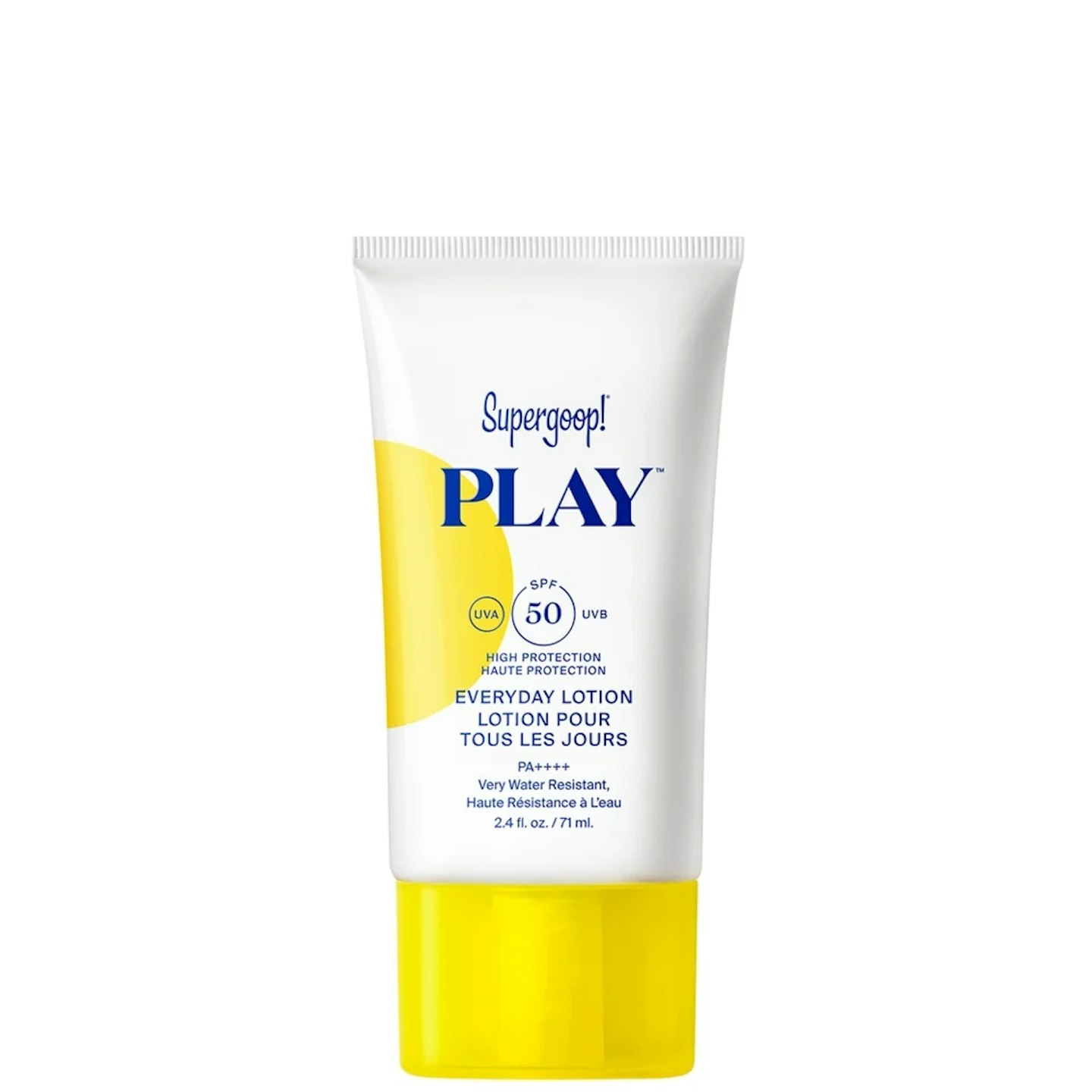 Supergoop!
Supergoop! www.cultbeauty.co.uk
What the brand says: 'PLAY Everyday Lotion was created to correct everything you ever disliked about sunscreen. It feels amazing, it absorbs quickly and has a fresh scent, plus it's never sticky or tacky. This was actually the first traditional sunscreen ever created without oxybenzone! PLAY nourishes your skin while it protects against UVA/UVB and infrared radiation, and it's non-comedogenic so it won't clog pores. This is our classic, original sunscreen lotion that's been a beloved fan favorite for 15+ years — even kiddos enjoy applying it!'
What we know: This cult classic brand has churned out a stellar line of SPFs, each earning a seal of approval from beauty buffs who are in the know. This SPF in particular promises to be fast-absorbing, non-greasy, hydrating, and is water- and sweat-resistant for 80 minutes. It won't leave a white cast and is suitable for normal, combination, dry or oily skin.
Renee Washington digital fashion and beauty writer, says: 'As someone with darker skin, finding an SPF that doesn’t leave an ashy cast is a constant battle. This is a game-changer. The gel-like formula glides on and absorbs quickly, doesn’t feel greasy and, crucially, it’s invisible.’
Pros
- Invisible formula
- Gel-like texture
Cons
- Might not work for a drier skin
| SPF level | SPF50 |
| Size | 71ml |
| Mineral or chemical | Chemical |
| Key ingredients | sunflower, rosemary and rice bran extracts |
| Consistency | Light |
What the brand says: This is. fast-absorbing, non-greasy and fragrance-free formula that leaves skin with a satin finish. It comes with a SPF50+ PA++++ shields against UVA and UVB rays and protects against sun damage and photo-ageing, while being kind-to-skin, dermatologist-tested, safe for sensitive skin, and octinoxiate and oxybenzone-free.
What we know: Bursting with skin-loving ingredients like as hyaluronic acid, aloe vera and antioxidant vitamin E this SPF can be likened to serum thanks to its uber-nourishing effects and glow-giving qualities. It glides into skin, seamlessly blends with the rest of your skincare products, and wears flawlessly under make-up. It is super light in texture and blends. toa totally transparent finish.
Sameeha Shaikh, beauty writer, says:**** ‘It was love at first pump with this SPF, how many of us can say that? As essential as they are, most sunscreens can leave skin feeling heavy and clogged, which is the last thing you want on holiday. This SPF flips the script. The ultra-light, hybrid water-gel texture, loaded with aloe vera, vitamin E and hyaluronic acid, feels much more like a calming serum than a broad-spectrum sun protector. Once glided over skin, the white lotion turns transparent and imparts an uber-refreshing and comfortable protective glaze on the skin, all without the greasy feel. The best bit? It suits all skin tones, types and is wondrous under make-up.'
Pros
- Refreshing water-gel formula
- Transparent finish
Cons
- Some reviews say the smell is quite strong
| SPF level | SPF50 |
| Size | 60ml |
| Mineral or chemical | Chemical |
| Key ingredients | Hyaluronic acid, aloe vera and vitamin E |
| Consistency | Lightweight |
What the brand says: 'An invisible, lightweight UV protective cream whose protective veil is strengthened by heat and water, and re-smooths on its own. It protects the inner and outer skin layers against UVA and UVB, with strong protection combined with skincare benefits,' including four hour hydration, and protection from pollution and blue light.
What we know: Shiseido has built up a good reputation as an expert sun protector. This SPF is lightweight and completely invisible - a great start. Apart from protecting your skin against harmful UVA and UVBs, the formula helps create a smooth and plump complexion thanks to the special safflower extract, and algae complex. Unlike most SPFs, this formula is actually strengthened by heat and water, making it a great SPF to pack on your next holiday. It is suited to dry, oily, normal, and combination skin.
Marina Avraam, deputy commercial content editor, says : 'For my test, I used my usual moisturiser before applying a layer of this and locking everything in with a primer. My initial reaction was - no white cast! I massaged the lotion into my face and neck, and was immediately taken aback by how quickly the product absorbed into the skin. Tiny caveat, the SPF does have a somewhat grapefruit-y scent which I personally loved, but it is something to be wary of if you don't enjoy fragranced products.I continued to apply the rest of my make-up as I usually would, and apart from being invisible to the naked eye, I also noticed no pilling, which is the case with plenty of SPFs. Using it for over a period of one week, I noticed zero breakouts, nor any change in skin texture. If anything, my skin looked plumper, smoother and - importantly - protected against sun damage.
Pros
- Responsive UV protection
- Infused with 69% skincare ingredients
Cons
- Harder to remove – may require a double cleanse
| SPF level | SPF 50 |
| Size | 50ml |
| Mineral or chemical | Mineral |
| Key ingredients | Safflower extract and algae complex |
| Consistency | Thin |
What the brand says: 'A weightless, oil-free mineral sunscreen that protects against UVA/UVB and blue light damage while visibly smoothing texture, minimising pores and enhancing radiance. Formulated with 10% zinc oxide and skincare-grade ingredients for a finish that feels like your favourite serum.'
What we know: It's the sunscreen that skincare insiders actually enjoy applying - an SPF that behaves like a treatment, not a chore. With its elegant formula and subtle glow, it’s already earned cult status among beauty editors and celebrity facialists alike. Like everything from Tatcha, it’s rooted in traditional Japanese ingredients and rituals, but reimagined for modern skin needs. The Silk Sunscreen’s mission? To protect and perfect in one step - leaving skin feeling as good as it looks.
Georgia Scott, product writer, says: 'I've tried and tested hundreds of SPFs in my time, so I know exactly what to look for in a formula. In a nutshell - I want a lightweight, nourishing formula that feels weightless without any white cast. Spoiler alert - this product hits the brief, and then some. Firstly, let's talk texture. Many SPFs can lean on the chalky and thick side, they might even pill under foundation, but not with this one. The Silk Sunscreen does exactly what it promises; the silky texture seamlessly blends into the skin, and the sheer, tinted shade is undetectable on the skin. Although I have dry skin, I hate the feeling of anything too thick or sticky, and this SPF feels comfortable and weightless under make-up. Next, the formula. Loaded with silk protein, antioxidant-rich niacinamide, hyaluronic acid and skin-strengthening Japanese wild rose extract, this mineral SPF doesn’t just protect - it actively works to nourish and visibly refine the skin. The formula glides on like skincare, leaves no white cast, and has a luminous, barely-there finish.'
Pros
- Lightweight, non-greasy texture
- No white cast, making it suitable for different skin tnes
- Works well under makeup
Cons
- Slight scent may be off-putting to some
- Some users find the formula to be quite liquid, which can lead to product wastage
| SPF level | SPF50 |
| Size | 50ml |
| Mineral or chemical | Chemical |
| Key ingredients | Silk protein, niacinamide, hyaluronic acid and Japanese wild rose extract |
| Consistency | Silky and light |
Best multitasking face sunscreen
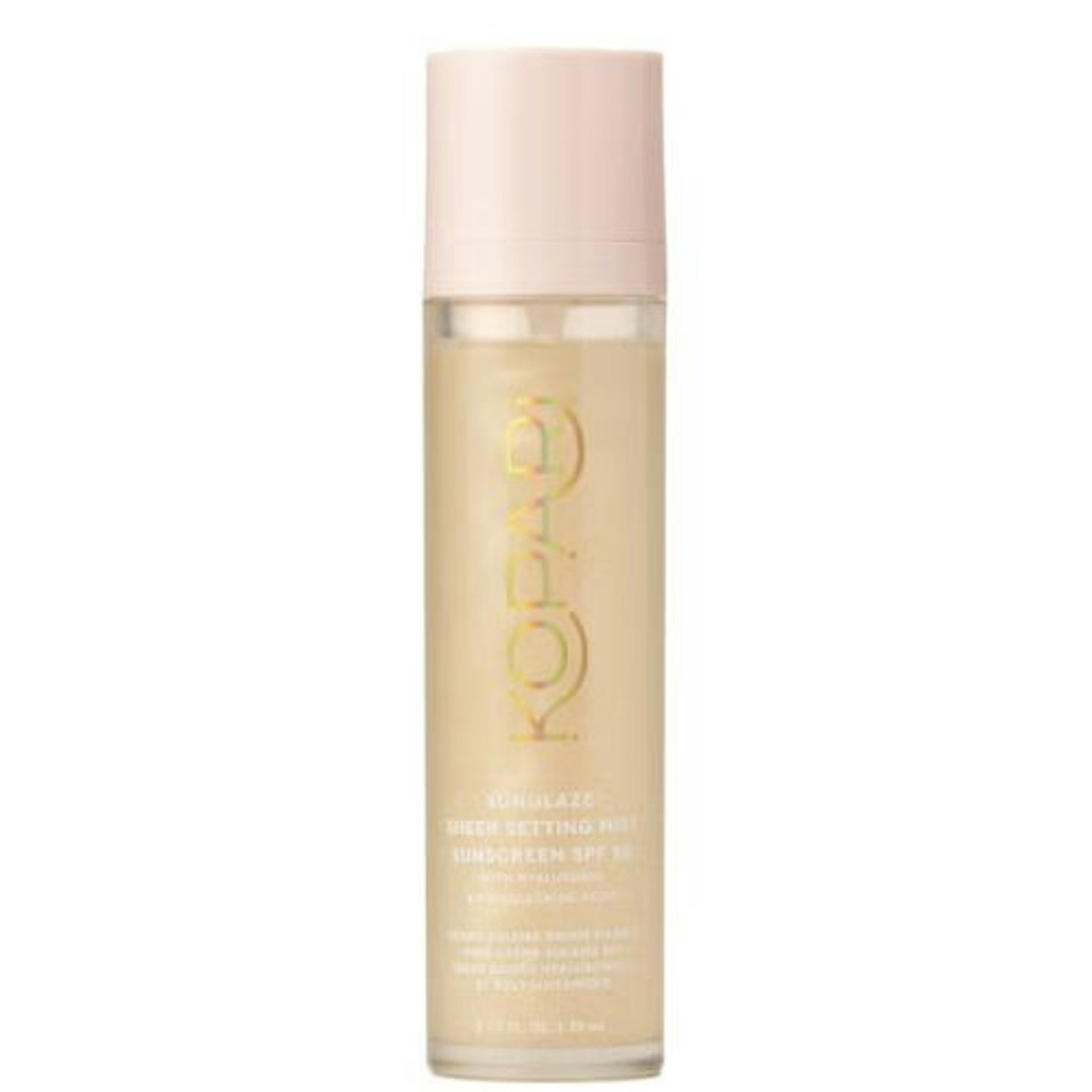 Kopari
Kopari www.cultbeauty.co.uk
What the brand says: 'Shield your skin from harmful rays and glow from within with Sunglaze Sheer Setting Mist Sunscreen SPF 50. Designed for daily use, this ultra-fine, lightweight mist dries quickly, seamlessly applying over skincare or make-up. Infused with hyaluronic and polyglutamic acids, it hydrates skin for that glass skin finish that lasts all day. Plus, transport yourself to paradise with the subtle & refreshing natural melon scent. Reapplying sunscreen or finishing your routine has never been easier!'
What we know: The US beauty brand is a rising star, popping up constantly on our feeds. We all know SPF is a non-negotiable step in any skincare routine all year round, and Kopari delivers with face and body sunscreens that not only protect but also leave your skin gleaming. Think radiant glow, perfect for your next beach club look. The Sunglaze range has gone viral, specifically the Sunglaze Sheer Setting Mist, known for its skincare-meets-glow finish - and honestly, it’s exactly what your beach bag’s been missing.
Georgia Scott, product writer, says: 'Beauty lovers are scrambling to get their hands on this viral sensation after TikTok was flooded with glowing reviews, and promptly leading it to sell out. Influencers have crowned it "glass skin in a bottle" - and with that dewy, radiant finish, it’s easy to see why. The non-sticky formula is packed with skin-loving ingredients like hyaluronic acid (hydration is a key on beach days, after all) as well as vitamins C and E, plus broad-spectrum protection to guard against both UVA and UVB rays.'
Pros
- Multitasker that provides suncare, a glowy base and sets make-up
- Loaded with skin-loving heroes
Cons
- Scent may not suit some
| SPF level | SPF50 |
| Size | 75ml |
| Mineral or chemical | Mineral |
| Key ingredients | hyaluronic acid as well as vitamins C and E |
| Consistency | Light mist |
Best spot-correcting face sunscreen
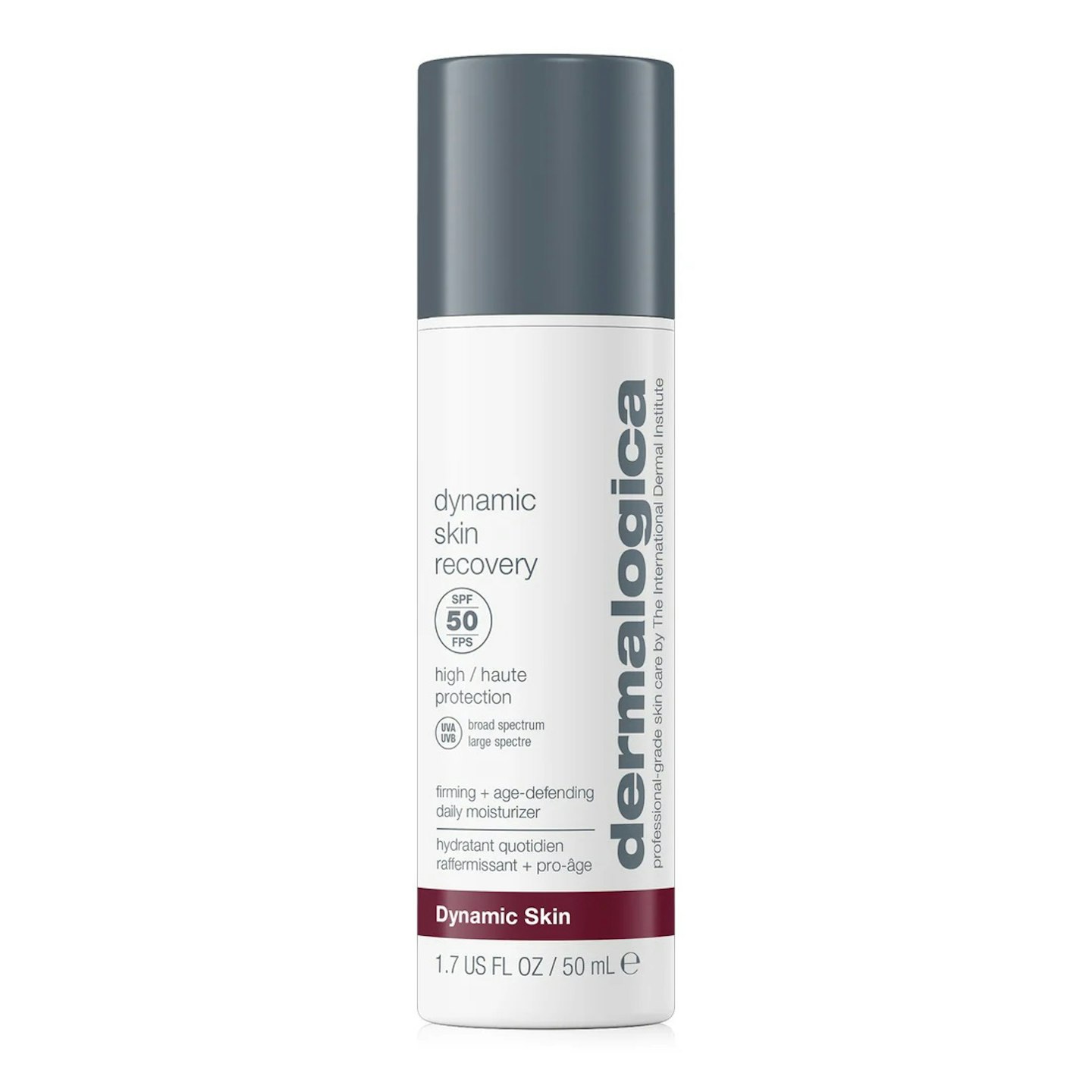 111skin
111skinwww.spacenk.com
What the brand says: This active sunscreen defends against UVA and UVB rays with broad spectrum SPF50, all while providing long-lasting hydration, controlling the triggers that lead to skin ageing, and evening skin tone and dark spots, with a formula that blends smoothly into skin.
What we know: A longtime go-to brand for those looking to step up their skincare game, Dermalogica's Dynamic Skin Recovery SPF 50 features antioxidant white tea, rich in polyphenols, and a unique polypeptide, which help improve the appearance of photoaged skin.
Sameeha Shaikh, beauty writer, says:**** 'I have been pleasantly surprised by this SPF. While the brand calls the formula medium-thick, the easy-to-blend formula worked quickly, gliding with ease, and absorbed into my skin with no fuss, leaving behind an almost addictively smooth, satin finish that sat comfortably on the skin. The promise of a more firm complexion is no fib, too, as just a layer of the stuff lent my skin a healthy-looking plump, thanks no doubt to the cushiony, polypeptides-loaded formula which boosts the production of skin collagen and elastin. So, while the packaging is clinical and perhaps more outdated than its loud modern counterparts, this SPF proves it's what's on the inside that counts.'
Pros
- Combat the appearance of skin ageing
- Designed to repair
Cons
- Outdated-looking packaging
| SPF level | SPF50 |
| Size | 50ml |
| Mineral or chemical | Chemical |
| Key ingredients | White te and polypeptides |
| Consistency | Medium-thick |
Best K-beauty face sunscreen
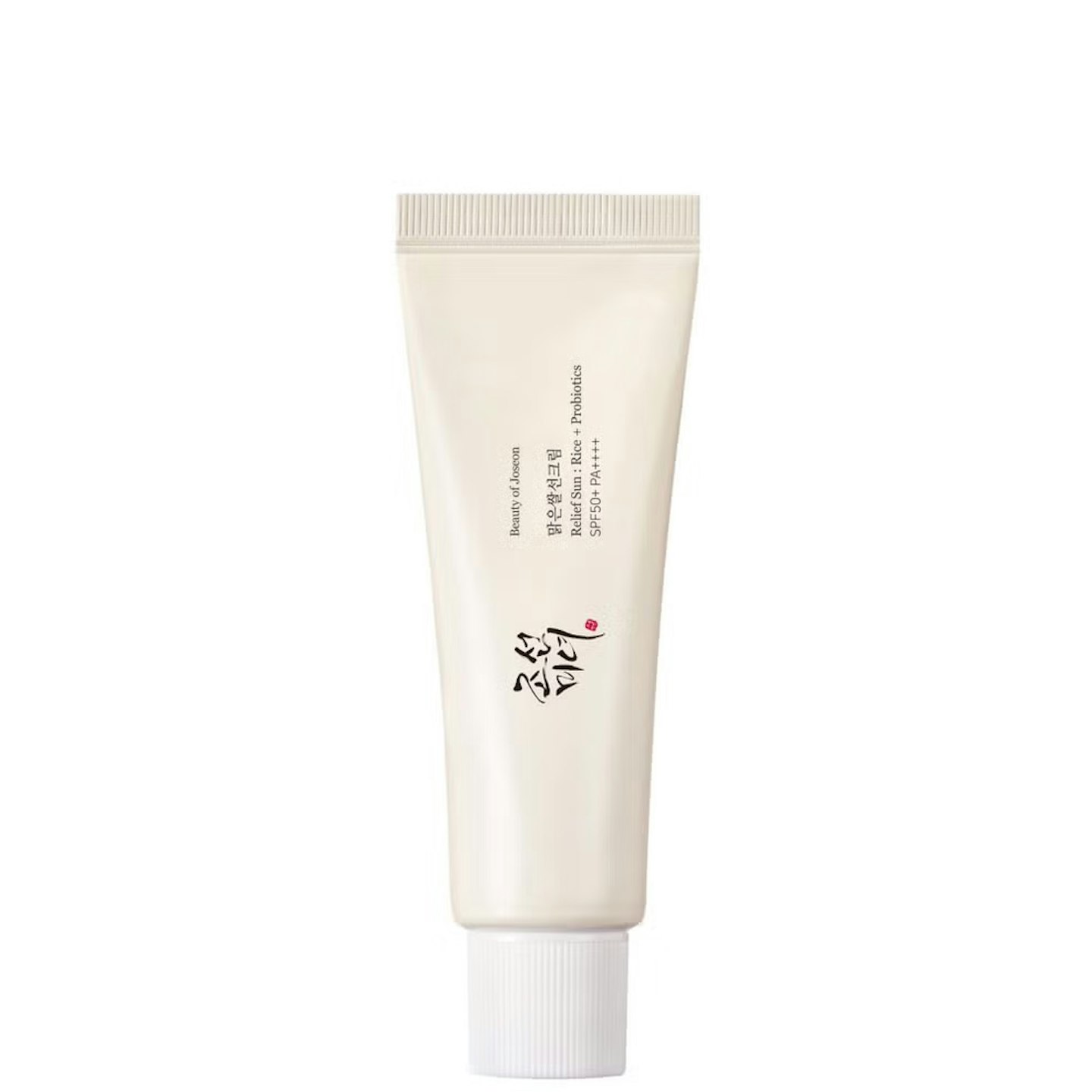 MZ Skin
MZ Skinwww.lookfantastic.com
What the brand says: 'Treat your skin to this clean, lightweight sunscreen with rice extract that comfortably hydrates for a non-sticky application and leaves your complexion dewy, bouncy, and bright.'
What we know: A few scrolls on TikTok's #Kbeauty feed will quickly prove how much sway this SPF holds. As the brand's bestseller, it achieves what many sun protectors don't – being creamy, hydrating and yet light and non-greasy. It comes with high sun protection as well as the added benefits of vitamin and antioxidant-rich 30% rice extract and fermented grain extracts, which collectively sooth and nourish.
Natalie Hammond, senior fashion news editor, says: 'Die-hard fans of the brand will be on first-name terms with its hero product: Relief Sun: Rice + Probiotics. This SPF 50 sun cream is the opposite of the highly effective but highly greasy, sticky, smothering formulas you probably associate with summertime. It feels like a lightweight moisturiser in my fingers and glided – glided! – onto my face just this morning, with a pleasingly matte finish that left my skin feeling bouncy and supple. Wearing this every day is a pleasure not a chore!'
Pros
- Suitable acne-prone skin
- Sooths and protects with a lightweight texture
Cons
- May be too glow-giving for those who prefer a matte finish
| SPF level | SPF50+ PA++++ |
| Size | 50ml |
| Mineral or chemical | Chemical |
| Key ingredients | 30% rice extract and fermented grain extracts |
| Consistency | Light |
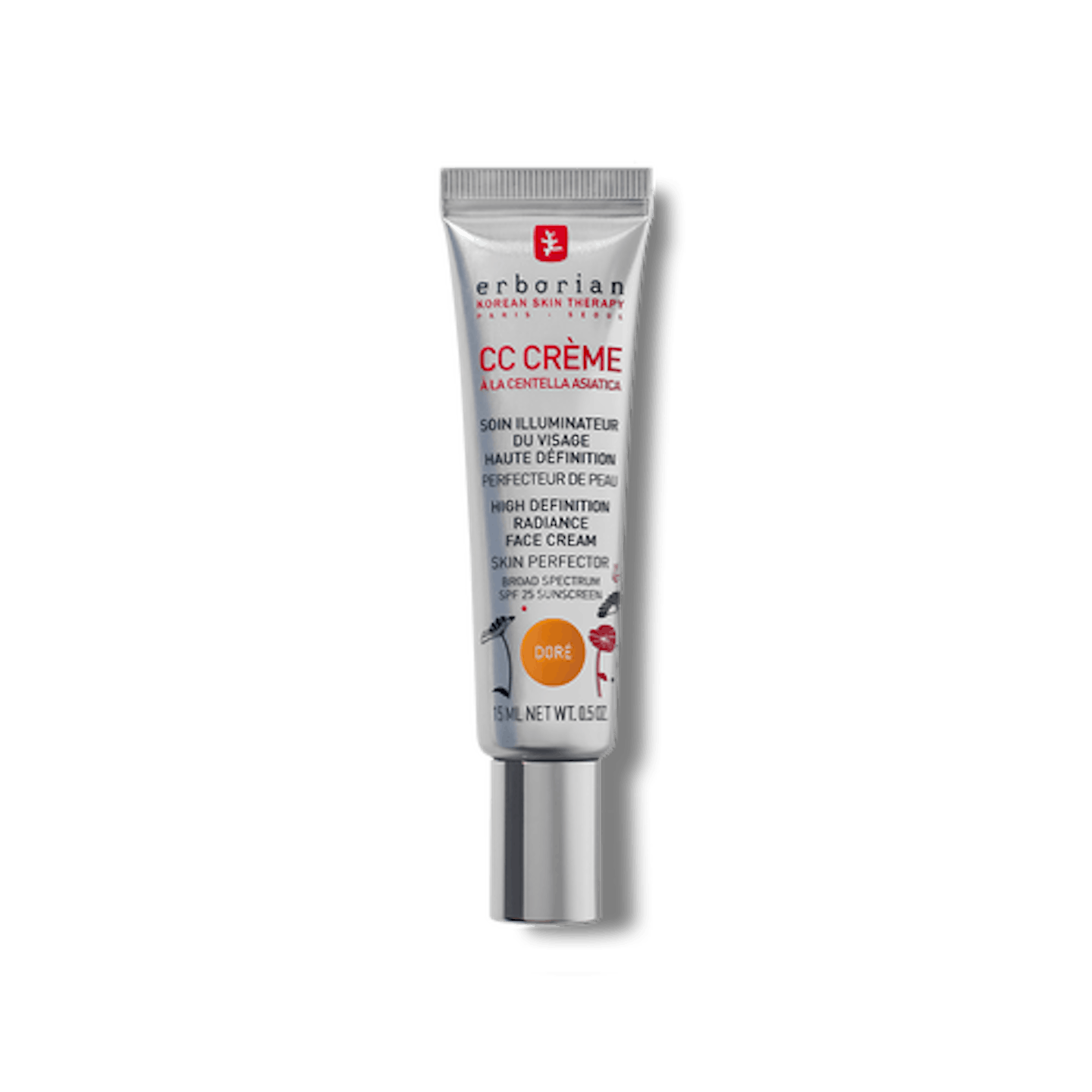
uk.erborian.com
What the brand says: 'The skin perfector that helps to immediately reveal an even toned, luminous complexion while taking care of your skin every day. This unique formula contains encapsulated pigments that change colour on contact with the skin. They work to even out skin tone and subtly enhance the complexion, providing light coverage and a natural looking finish. The lightweight texture blends into the skin, immediately helping to blur the skin's texture and minor imperfections.'
What we know: This CC cream is so popular that one tube sells every 20 seconds worldwide. Impressive stuff, but so is the product itself. A hybrid between skincare and make-up, it perfects the look of skin while tending to it over time with the help of centella asiatica AKA tiger grass, which is used in traditional Korean medicine to sooth, and SPF25.
Sameeha Shaikh, beauty writer, says: 'If you're looking for an every day, no-fuss solution to a perfect base, look no further than this. It is far thicker than its water-based sister (the Erborian CC Water, £42) yet still super breathable, light and refreshing. While the cream comes out white, the unique formula's encapsulated pigments change colour as you begin to rub it in, and blended into my natural skin tone with ease. It leaves me with a natural, second-skin, satin finish and quickly evens out my post-inflammation hyperpigmentation with a luminous, buildable coverage that holds up comfortably throughout the day. In a word: Obsessed.'
Pros
- Skin adapting encapsulated pigments
- Breathable formula
Cons
- Limited shade range
| SPF level | SPF25 |
| Size | 45ml |
| Mineral or chemical | Mineral and chemical |
| Key ingredients | Sentella asiatica |
| Consistency | Medium, breathable |
What the brand says: 'The most important step in your skincare routine, Polyglutamic Acid Dewy Sunscreen SPF 30 is your daily necessity for protected, primed and dewy skin. A broad-spectrum SPF 30 with UVA & UVB protection, this lightweight sunscreen has been formulated to work for all skin tones and blend seamlessly into the skin leaving an undetectable, dewy finish.'
What we know: The Inkey List is well-loved for its stripped-back and targeted approach byway of single-ingredient products that help to take the guesswork out of skincare. When it comes to sun care the brand, spotlights polyglutamic acid, as well as glycerin and squalane, to create a 8% hydration trio that work in synergy to seal in moisture for protected, primed and dewy skin.
Sameeha Shaikh, beauty writer, says: 'This is what I'd call a no-fuss sunscreen hero. It's thick, almost whipped texture is nourishing yet easy to work into the skin, and its hydrating finish is no joke – it even got to work on a flaky dry patchy on my chin and left my skin feeling cool and soothed, so definitely a win on the comfort front. While I didn't find it lent my skin a glossy, high-shine dewy glow (which often bodes well with make-up application), I did love its smooth and silky finish.'
Pros
- Infused with polyglutamic acid, glycerin and squalane
- Affordable price point
Cons
- Doesn't provide a very 'dewy' finish
| SPF level | SPF30 |
| Size | 50ml |
| Mineral or chemical | Chemical |
| Key ingredients | Polyglutamic acid, glycerin and squalane |
| Consistency | Thick |
What the brand says: This easy to use SPF stick makes the job of on-the-go sun protection more convenient and allows for quick application on the face, lips and sensitive areas like moles, scars, and tattoos. It is fragrance-free and water-resistant, and is suitable for both adults and children aged 3 and over thanks to its sensitive skin-approved formaula that has been tested under dermatological supervision.
What we know: Caudalie knows a thing or two about sensitive skin (look to its VinoHydra range for the proof which boasts a few bestsellers). This stick SPF goes big on maintaining that reputation, with a formula enriched with organic grapeseed and buriti oil, which collectively nourish, sooth and protect.
Sameeha Shaikh, beauty writer, says: 'I love any product that shakes up my beauty routine, and this has certainly rocked the boat in the best of ways. I had never looked to stick-form SPFs as a means to apply sun care but Caudalie's Vinosun Invisible High Protection Stick SPF50 proves that you can explore the essential skincare step through different and more convenient mediums. This is perfect for a quick swipe-and-go moment, first thing in the morning or while holidaying pool-side. The formula is super nourishing and leaves the skin glistening, not greasy. Plus, I love how easy it is to reapply whenever and where ever I need. Which leads me to the big question - can you reapply this over a full face of make-up? For me, it was a resounding no. Trying to apply the stick over my foundation quickly worked to remove it entirely. That said, for the days I went sans make-up (which is most days on holiday and the weekends), this SPF worked a treat.'
Pros
- Convenient stick-form SPF
- Great for sensitive skin
Cons
- Can't be applied over make-up without smudging it
| SPF level | SPF50- |
| Size | 15g |
| Mineral or chemical | |
| Key ingredients | Organic grapeseed and buriti oil |
| Consistency | Light |
What the brand says: 'Invisible UV Flawless Poreless Primer is the ultimate soft-focus beauty glow filter that creates the most beautiful flawless, poreless looking canvas for make-up whilst providing hydration and essential DAILY UVA/UVB defence with SPF 50 for everyone of every age, skin type and skin tone!'
What we know: Creating a Paris-filter-in-a-bottle type product is second nature to Charlotte Tilbury MBE, who has encapsulated the skin finish with a plethora of beauty buys including the cult classic Hollywood Flawless Filter, £39. You can expect the same from the brand's Invisible UV Flawless Poreless Primer, which boasts a cocktail of hardworking ingredients like hyaluronic acid, the brand's Collalift™18 (which is extracted from the bark of the African mahogany tree for its smart ageing benefits), Charlotte Tilbury's Magic 8 Matrix of Oils & Actives, which encompasses BioNymph peptide, camellia oil and aloe vera. But that filter-finish is all made possible through Airbrush Polymers, which smooth and blur to perfection. Not bad for an SPF.
Sameeha Shaikh, beauty writer, says:**** 'I am admittedly addicted to the airbrush finish that comes hand in hand with Charlotte Tilbury's coveted beauty products and while I didn't think the same could be achieved with an SPF, this delivers on that front. The pink-hued cream blends into a clear sheen that leaves skin velvety smooth, and it sits beautifully under make-up (of course).'
Pros
- Brilliant under make-up
- Boasts a cocktail of patented, harworking ingredients.
Cons
- Opaque packaging means you can't tell how much product is left
| SPF level | SPF50 |
| Size | 30ml |
| Mineral or chemical | Chemical |
| Key ingredients | Hyaluronic acid, plus the brand's Collalift™18 and Magic 8 Matrix of Oils & Active |
| Consistency | Light-medium |
What the brand says: 'Where Hydration meets Pure Protection. A serum-infused SPF30 moisturiser that provides antioxidant & anti-pollution defence. Non-nano mineral filters also shield against UVA & UVB rays. Lightweight & fast absorbing, it is suitable for all skin types.'
What we know: The Organic Pharmacy's pull comes from its use of certified organics and the triple expertise made up of a pharmacist, dermatologist and beauty experts, which help to create clinically proven skincare solutions. Results from tests on this SPF were clinically proven to increase moisturisation by 36.3% and reduce oxidative stress. Loaded with triple molecular hyaluronic acid, carrot root extract, witch hazel water, it intensely hydrates while soothing skin and providing rich antioxidant protection.
Sameeha Shaikh, beauty writer, says: ' Off the bat, this is a mineral sunscreen that leaves a strong white-grey cast on my medium skin tone. You can certainly see the serious level of coverage and protection it provides based on that alone, but I did have to really blend the product in to make it more wearable but there was still a slight discoloured wash despite my efforts. That said, the serum-like, light texture felt lovely on my skin and lefts a silky soft feel that paired well under make-up.'
Pros
- Loaded with vitamin A-rich carrot extract
- Serum-like texture
Cons
- Leaves a strong white cast
| SPF level | SPF30 |
| Size | 50ml |
| Mineral or chemical | Mineral |
| Key ingredients | Hyaluronic acid, carrot root extract, and witch hazel water |
| Consistency | Medium, serum-like |
What the brand says: 'Dermatologically-approved, Serene Daily SPF 50+ is a fast-absorbing broad spectrum sunscreen for sensitive skin that feels like a weightless moisturiser, protecting your skin from photo-ageing and damage caused by UVA and UVB rays.'
What we know: This brand has a personal connection to sensitive skin and was created by Sarah (hence the name) who developed a line of products to tend to sister Lauren's 'cancer ravaged skin'. It is the reason why each product is meticulously and consciously crafted to strike the balance between science and nature without upsetting skin. This SPF features a soothing mix of antioxidant-rich ginseng, as well as apple and peach to protect against skin damage, to help keep calm and deeply moisturised.
Sameeha Shaikh, beauty writer, says: 'As someone with acne-prone skin, I am always on the lookout for products that promise to keep unwanted side effects at bay and this SPF does exactly that. Its yellow tinted formula is extremely light and blends into a refreshing dewy sheen across the skin. And you'll be pleased to know there was no stinging or redness in sight. I can see myself reaching for this for many months to come.'
Pros
- Perfect for sensitive skin
- Lightweight and refreshing finish
Cons
- May be too light for those who prefer a more creamy base for make-up
| SPF level | SPF50 |
| Size | 30ml |
| Mineral or chemical | A broad spectrum formula combining modern, UVA and UVB filters to provide high coverage, daily protection for sensitive skin. |
| Key ingredients | Ginseng, apple and peach |
| Consistency | Light |
What the brand says: This innovation from Bioderma contains exclusive technology, inspired by its unique Nao Ecobiology approach, and protects the skin against UV rays, visible light, infrared rays and pollution, all while helping to detox the skin from pollution for more radiant-looking skin. It promises a long-lasting make-up effect, natural finish, and a 99% reduction in cellular damage from UV, visible light and infra-red.
What we know: Bioderma prides itself on serving skin biology and preserving skin health. This SPF contains the brand's Environmental Active Defense technology to shield skin while helping to visibly balance with eight hours hydration and an all day matte effect that works seamlessly with make-up. It contains minimalism sunscreen filters and no unnecessary ingredients for the skin ( like microplastics and silicones).
Sameeha Shaikh, beauty writer, says:**** 'This SPF screams high tech. It comes with the promise of next-level sun protection as well as detoxification by helping skin to produce its own pollutant-neutralising and antioxidant enzymes which ergo boost our natural defence against sun and pollution. Clever stuff. The formula is light and runny making it very blendable and easy to work into the skin, and I loved the glossy veil it left behind. As promised, it really does work very well under make-up and sat beneath my foundation in a way that elevated the entirety of my look throughout the day. This is an easy win.'
Pros
- Innovative Environmental Active Defense and Detox Science technology
- Make-up enhancing formula
Cons
- Clinical packaging
What the brand says: 'This ultra-lightweight fluid is a true SPF superstar– delivering the ultimate combination of hydrating, soothing and barrier-boosting defence against harmful UVA + UVB rays in one step. Think all the protection with none of the drawbacks like greasiness or white cast. Use as the final step of your skincare for instant glowing skin and broad spectrum protection – in factor 50.'
What we know: Formulated with the brand's Cera-Sun Technology, this SPF restores the skin barrier while correcting UV induced redness. It is packed with hyaluronic acid and asthaxanthin to help sooth, calm and deliver 6000x more antioxidant protection and brightening capabilities than vitamin C.
Sameeha Shaikh, beauty writer, says: 'To be perfectly honest, this SPF had me at its name. True to form it is uber-light and sheer on application and coasts the skin in a fluid satin-soft veil that leaves a serious glow. There is zero white cast or piling, and the cream sinks into skin effortlessly. While it is definitely lightweight, there is some grip to it which bodes really well with whatever base make-up you choose to apply atop. My often irritated skin always feels calm and comfortable post-application and throughout the day.
Pros
- Boasts Cerasun Technology to boost skin barrier health
- Features asthaxanthin, which is 6000x more powerful than vitamin C
Cons
- Lid can become lose overtime
| SPF level | SPF50 |
| Size | 50ml |
| Mineral or chemical | Chemical |
| Key ingredients | Cera-Sun Technology, hyaluronic acid and asthaxanthin |
| Consistency | Thin |
What the brand says: Eucerin's SPF helps to effectively reduce all types of dark spots and prevents their re-appearance, all while protecting against future sun-induced spots. It provides UVA/UVB and blue light protection and comes with SPF30.
What we know: The brand's patented Thiamadol helps to reduce dark spots and prevent their reappearance, while anti-inflammatory and antioxidant active licochalcone A protects cells from oxidative stress byway of activating anti-inflammatory, antioxidant and detoxifying enzymes.
Sameeha Shaikh, beauty writer, says: 'A few swipes of this will leave a refreshing and cool feel to the skin. While yellow in colour, it blends out to a transparent finish that lends skin a subtle glow. It is featherweight and its comfortably on the skin with little fuss. There is a strong cosmetic scent to be conscious of if you prefer completely fragrance-free formulas, but I actually enjoyed the smell of this which was more clinical than anything. While I haven't seen a massive shift in hyperpigmentation, I did notice that my skin always appears more even and radiant with this so I will happily continue to use with the hope that it will soon correct my pesky post-inflammation hyperpigmentation.'
Pros
- Contains dark spot targetting ingredients
- Cool and refreshing feel on the skin
Cons
- Has a strong clinical smell
| SPF level | SPF30 |
| Size | 50ml |
| Mineral or chemical | Chemical |
| Key ingredients | Thiamadol and licochalcone A |
| Consistency | Light |
What the brand says: Blending sun care with skincare, this ultra lightweight and brightening serum sunscreen comes equipped with broad spectrum SPF50+ protection and a sophisticated skin-loving formula that boosts hydration and radiance.
What we know: As far as cult sun care brands go, Mecca Cosmetica knows a thing or two. The Australian native line has declared itself an expert in the field, saying ' Put simply, we know sun safety. We live it daily.' This Sun Serum features superior skincare benefits with the inclusion of 3% niacinamide, liquorice extract and tocopheryl acetate, which work to smooth skin, bolster radiance, reduce the appearance of pigmentation, and protect against environmental aggressors.
Sameeha Shaikh, beauty writer, says: 'I was eager to try this given its noteworthy industry reputation. Immediately, its pink tinted formula, while runny was sumptuous, required a fair amount of blending until it finally ran transparent sans any white cast on the skin. But once blended in, it leaves one of the most beautiful glossy healthy-looking residues on the skin, without that greasy feeling. There is enough tack for seamless foundation or concealer application, but nothing that ever made my skin feel heavy or uncomfortable. In fact, it's one of the most comfortable SPF I've tried so far.'
Pros
- Superior skincare benefits
- High gloss finish
Cons
- Requires some effort to blend in until transparent
| SPF level | SPF50 |
| Size | 50ml |
| Mineral or chemical | Chemical |
| Key ingredients | Niacinamide, liquorice extract and tocopheryl acetate |
| Consistency | Runny and light |
What the brand says: 'Whether you're in the city, on the beach or in the mountains, the Invisible Sun Care Stick is a must-have. Its pocket size makes it ideal for quick touch-ups, so you can take it with you anywhere. Application is quick and practical. In a single step, it provides effective protection for exposed sensitive areas and precisely delivers an invisible, non-greasy texture. Thanks to its transparent finish, it can even be applied over make-up without moving it and leaves it feeling dry and velvety soft.'
What we know: The formula includes Solar Protect Complex to prevent photo-ageing and guarantee broad-spectrum protection against UVA/UVB rays and blue light. A combination of organic cocoa extract and vitamin E derivative helps to promote collagen production and protect the skin from oxidative stress, while aloe vera extract and organic argan oil further protect and nourish.
Sameeha Shaikh, beauty writer, says: 'This really is as portable and fool-proof as sun care gets. Easy to carry and keep handy while on-the-go, the sheer convenience of the product means I've really taken to stick SPF formats since trying this. It glides over skin with its stiff jelly-looking texture and coats skin in a transparent satin smooth glaze that feels very comfortable. And surprisingly you can apply it over make-up without totally running all your hard work, but I've found that works for more simple, every day looks rather than full-glam. That said, I'm already packing this for my holiday skincare kit.'
Pros
- Portable, easy-to-use stick format
- Precision application
Cons
- Has a slight floral scent
| SPF level | SPF50 |
| Size | 17g |
| Mineral or chemical | Chemical |
| Key ingredients | Organic cocoa extractm, vitamin E derivative, aloe vera extract and organic argan oil |
| Consistency | Stick |
SPF FAQs
What SPF is best for face?
The best SPF for face is one that offers broad-spectrum protection with an SPF and PA 5-star rating system. Use an SPF of at least 30, but SPF50 is more desirable as it will blocks around 98% of UVB rays. Find a formula that works best for your skin type and condition, which will help you stay consistent with daily application and reapplication.
What is the best sunscreen for older skin?
For mature skin look for tinted or antioxidant-rich formulas that can help to brighten and smooth fine lines.
Do you still tan with SPF 50?
Yes, you can still catch a tan but using SPF50 will protect skin from the harmful effects of prolonged sun exposure.
Is La Roche-Posay sunscreen good?
La Roche-Posay offers an array of industry standard sunscreens that cater to all. It's newest offering, theLa Roche-Posay Anthelios UVAir Daily Invisible Fluid SPF50+, £25, is ultra-light and fully protective.
What SPF should I use on my face daily?
You should use a broad-spectrum protection sunscreen with a SPF of 50 daily and aim to reapply some form of sun protection intermittently throughout the day.
Sameeha Shaikh is Grazia's beauty writer, covering all categories to bring you insights on the latest trends, industry news and the products you need to know about, viral or not (most probably viral).








